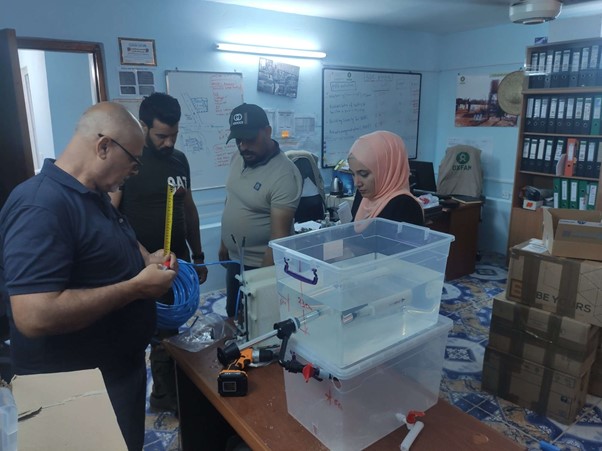Shaping the future: Our strategy for research and innovation in humanitarian response.

Shaping the future: Our strategy for research and innovation in humanitarian response.


The aim of our study is twofold. We are evaluating four types of household drinking water filters that remove pathogenic organisms from drinking water in emergency context. We are also using the study to validate the manual for field evaluation on “Selecting household water filters in emergencies” developed during our previous project. Before we started with the field work, there were a number of activities we needed to complete.
New optimized prototypes of the filters
The two filter manufacturers, Faircap and Forthemany (JERRY filters), developed new optimized prototypes of the two previously developed HIF household filter innovations. Both manufactures worked closely together and exchanged on the challenges, particularly logistical constraints. They are looking to gain valuable insights on technical performance, the ease of assembly and use, the acceptance of the filters by the users and detailed feedback of the users, including what aspects could be improved. By the end, the manufacturers want to further adapt the design of the filters to better fit the needs of communities.
Selecting the other two innovative filters from those available on the market
We used the criteria for selecting water filters in emergency settings developed in our last project to select the two additional household drinking water filters by screening the currently available filters. We focused only on the ultrafiltration-based membrane filters to ensure better comparability to Faircap and JERRY filters. The two different filtration methods included are on one hand gravity driven filtration and on the other hand filtration through manual pumping. The availability of the filters and delivery time was an additional factor to consider as well as the costs. The exchange with local field teams and international WASH experts led to the final selection of the household drinking water filters.
Preparing for the Field Evaluation
The four filter types were then tested in depth in the laboratory at FHNW. The log removal values for all filters exceed the Log 4 for removing bacteria among all the filters. Therefore, the WHO performance criteria in the removal of bacteria by household water treatment technologies were fulfilled. Meanwhile, the manufacturers produced around 140 prototypes of the filters each. Shipment to Iraq and Gaza was organised, with all the we experienced in both locations such as exportation restrictions of manufacturers and complicated importation procedures due to local regulations. For importation to Palestine, a detailed protocol on how the importation can be further facilitated is about to be developed together with an importation facilitator.
In parallel and together with our partners we finalized the field study methodology. We adapted the interview templates to the local context. CESVI and Oxfam received ethical approval for the field research from the local ethics committees. Community mobilisers from the respective villages were recruited and trained to collect data with appropriate sensitivity. The local laboratories for water quality analysis were set up, and the necessary knowledge was transferred. Due to the pandemic, a lot of the training took place online.
Before the filters were distributed, baseline data collection took place to collect general information about the household’s water supply and the general situation. Communities were identified based on their need for a water filter. We informed people, determined whether they were interested in participating and collected oral and written informed consent. The type of filters the household received was randomised. The households could draw a ticket out of a box, which determined the filter type they received.
Cesvi and Oxfam obtained local water containers and used them as housing for the filters. The teams distributed all filters to the communities during December 2021 – February 2022.
We will tell you more about the distribution of the filters in a next blog entry.

 Please upgrade your browser
Please upgrade your browser
You are seeing this because you are using a browser that is not supported. The Elrha website is built using modern technology and standards. We recommend upgrading your browser with one of the following to properly view our website:
Windows MacPlease note that this is not an exhaustive list of browsers. We also do not intend to recommend a particular manufacturer's browser over another's; only to suggest upgrading to a browser version that is compliant with current standards to give you the best and most secure browsing experience.